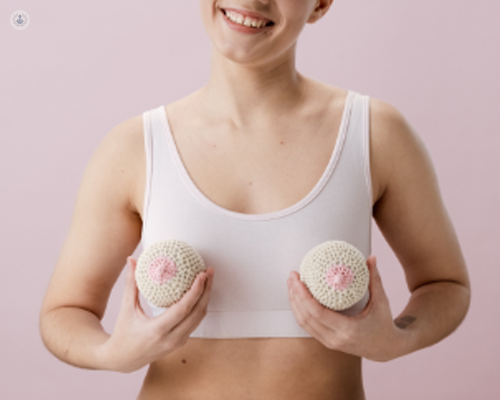Nipple-sparing mastectomy: don’t lose yourself
Written by:Nipple-sparing mastectomy is a surgery that treats breast cancer, involving the removal of cancerous tissue from the breast but leaving the nipple and as much skin as possible intact. Renowned consultant oncoplastic breast surgeon Professor Amtul Carmichael discusses the procedure in more detail in our latest article. The Birmingham- and Derby-based surgeon compares it to a total mastectomy, looks at who is an ideal candidate, and explains factors that can influence recovery time.

How does nipple-sparing mastectomy work?
One of the surgical techniques which can be used on women with breast cancer is called nipple-sparing mastectomy. In this operation, the breast tissue, which has got cancer in it, is removed but we spare the skin of the woman and we save her nipple. When the patient has reconstruction, her breast looks as natural and as normal as possible.
What is the difference between nipple-sparing mastectomy to a total mastectomy?
In a total mastectomy, surgeons remove breast tissue along with the skin and nipple whereas, in nipple-sparing mastectomy, we preserve the skin and the nipple of the patient. We remove the cancer-bearing area of the breast tissue and replace it with another type of tissue for breast reconstruction. So, while a total mastectomy leaves a woman with a flat chest, a nipple-sparing mastectomy gives a woman as natural an appearance as possible.
Who is eligible for nipple-sparing mastectomy?
Over the last decades, a lot of progress has been made in terms of nipple-sparing mastectomy. We tend to offer this operation to women who have moderate size breasts, are of medium or small build, whose cancer is not too close to their nipple, and are unlikely to receive radiotherapy after breast cancer treatment. With that being said, we have to choose patients on a case-by-case basis to assess their suitability for nipple-sparing mastectomy.
How long does it take to recover from a nipple-sparing mastectomy?
Recovery depends on what type of reconstruction a patient has after nipple-sparing mastectomy. For implant base reconstruction, most women are independent and self-caring within 24 hours of surgery, they're able to eat and drink, go to the toilet by themselves, and over the period of next two to three weeks they make a good recovery. However, if nipple-sparing mastectomy is associated with reconstruction from a tummy flap, a bit of tissue taken from the tummy, then that will require about two or three days to become fully independent because of the abdominal part of the surgery. Then most people recover within two to three weeks.
What happens after nipple-sparing mastectomy?
Once a patient has been offered a nipple-sparing mastectomy and reconstruction, a mastectomy specimen is sent away to be looked at under the microscope by our consultant histopathologists. Depending on what they find, the patient would be offered after-treatment which is called adjuvant therapy.
They may require anti-hormone tablets for the next five to ten years, they may require radiotherapy, occasionally they may require chemotherapy, and in some patients, more specialized treatment may be required depending on the characteristics of cancer. That discussion will take place between the patient and their oncologist to work out a personalized care plan for them.
If you would like to discuss this, or any other type of breast cancer surgery with Professor Amtul Carmichael, you can book a consultation with her directly by visiting her Top Doctors profile.


